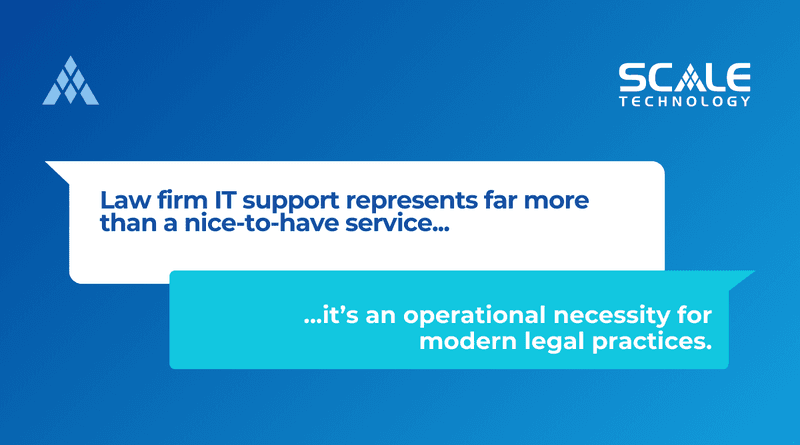If you're running a law firm, IT issues should not slow your practice down. You deal with sensitive client files, strict compliance requirements, and zero tolerance for downtime. When law firm IT support becomes a critical decision point, you face a key question: should you build an in-house IT team or partner with a managed service provider?
Key Takeaways
- Law firms require secure, fast, and legal-specific technology support that managed IT providers often deliver more effectively than in-house teams
- Core IT needs include reliable internet with firewall protection, legal software integration, encrypted cloud backups, and secure remote access
- Top cybersecurity threats include phishing attacks, ransomware, and inadequate access controls
- Must-have security tools encompass multi-factor authentication, encryption, firewalls, staff training, and access logging
- Managed IT services scale effectively for small firms and growing practices while remaining cost-effective
- Comprehensive disaster planning includes multiple backup systems and regular testing protocols
Understanding Core Requirements for Modern Law Firm IT Support
Legal work demands trust, speed, and regulatory compliance—which means your technology infrastructure must facilitate rather than hinder your practice. Your firm handles confidential client data, complex regulations, and extensive case files that require systems designed for security, accessibility, and user efficiency.
Why Legal Practices Need Specialized Technology Support
Law firm IT support requires more than general business technology assistance because attorneys aren't IT professionals—and that's perfectly acceptable. However, your legal work demands secure file management, rapid system access, and strict compliance controls.
Most small and mid-sized firms lack comprehensive IT departments, which explains why many legal teams rely on specialized technology support providers who understand legal software requirements, compliance obligations, and confidential file protection protocols.
Essential Technology Components Every Law Firm Requires
Modern law firms need significantly more than basic computers and printers to operate effectively:
- Reliable, Secure Internet Connectivity: Slow Wi-Fi networks waste valuable time. Your firm needs robust internet service protected by enterprise-grade firewall security.
- Legal-Specific Software Solutions: Specialized tools for billing management, case tracking, and client communication. Platforms like Clio provide comprehensive practice management capabilities designed specifically for legal professionals.
- Cloud Backup and File Storage Systems: Never depend solely on local file storage. Implement services and solutions that automatically store daily backups in secure, compliant cloud environments. Cloud Services for Law Firms: Are They Worth It?, an article from Scale Technology, provides further information.
- Compliant Communication Tools: Standard email systems can expose sensitive data. Legal teams require encrypted communication platforms that screen messages and maintain confidentiality standards.
- Secure Remote Access Capabilities: With hybrid work arrangements becoming standard, your technology tools must perform consistently whether staff work from office locations or remote environments.
Without these foundational elements, work productivity suffers while compliance problems and data security risks increase significantly.
Comparing Managed vs. In-House: Law Firm IT Support
Law firm IT support through managed service providers offers distinct advantages that in-house technical staff often cannot match. The primary benefit involves accessing specialized legal technology expertise without the expense of full-time staff salaries.
Service Range and Expertise Comparison
Managed IT Advantage: Comprehensive service coverage while in-house teams may lack specialized knowledge.
In-house technical staff might not understand cloud software platforms like Clio or complex remote access configurations. Managed service teams support cloud applications, remote systems, network infrastructure, and cybersecurity protection as integrated solutions.
Legal-specific tool expertise matters significantly for law firm operations. Managed providers understand how to maintain e-filing systems, trust accounting software, docketing applications, and large case file management systems.
Cost Structure and Financial Flexibility
Managed IT Advantage: Outsourced IT services adjust with firm growth while in-house teams create constant fixed expenses.
Hiring in-house staff requires paying salaries, payroll taxes, and benefit packages—expenses that remain steady regardless of actual workload demands. Law firm IT support through managed services allows you to pay for the specific support your practice requires.
For comprehensive information on whether your IT support needs are being met, browse this article on Law Firm IT Support. Scale Technology provides specialized support designed specifically for legal practice requirements.

Essential Cybersecurity Solutions for Legal Practice Protection: Law Firm IT Support
Cybersecurity protection extends beyond technology implementation—it protects your clients' confidential information and your firm's professional reputation. When your law firm experiences a security breach, you risk case losses, client data exposure, and potential malpractice lawsuits.
Most Common Security Threats Facing Law Firms
Law firms face three primary cybersecurity threats: phishing attacks, ransomware infections, and inadequate access security controls.
Phishing attacks trick users into clicking dangerous links that steal login credentials or install malicious software. Ransomware locks your files until you pay substantial fees to criminals. Weak or shared passwords make it easy for attackers to gain unauthorized system access.
Critical Security Tools and Implementation Strategies
Effective law firm cybersecurity requires multi-factor authentication (MFA), comprehensive encryption, enterprise firewalls, regular staff training, and detailed access logging.
- Multi-Factor Authentication (MFA) adds verification steps beyond simple password protection, significantly reducing unauthorized access risks.
- Encryption Technology scrambles your data so unauthorized individuals cannot read confidential information even if they gain system access.
- Enterprise Firewalls prevent malicious internet traffic from reaching your internal networks and systems.
- Staff Training Programs help your team avoid common mistakes and recognize potential security threats before they cause damage.
ABA research shows 1 in 4 firms has already have experienced security breaches. Smaller practices often maintain weaker protection systems, making them attractive targets for cybercriminals.
Implementing Cloud Services: Law Firm IT Support
Appropriate cloud systems make legal work more efficient and secure while providing the flexibility modern practices require. Cloud file management software like Clio or Azure provides easy access to case files from anywhere while tracking every change to ensure you always have the most current document versions.
Secure Cloud Storage and Access
Cloud Security Standards: Yes, cloud storage can be highly secure when providers implement proper encryption and meet regulatory requirements like HIPAA or SOC 2 compliance standards.
Select services that include built-in encryption, automated backups, and compliance certifications. Strong cloud providers also restore your data rapidly after system crashes or other emergencies.
Strategic Cloud Migration Planning
Plan your cloud transition carefully by creating detailed checklists covering what to migrate, migration timing, and user access protocols. Successful transitions occur in phases to avoid confusion and minimize operational risks.
For detailed guidance on Azure cloud services, Scale Technology offers comprehensive planning and implementation support tailored to legal practice requirements.
Daily IT Support Expectations for Law Firms
Around-the-Clock Support Availability
Critical Support Timing: Legal cases don't wait for business hours—and neither should your technology support services.
Law firm schedules often extend beyond traditional office hours, requiring IT support providers who match these demanding schedules.
Comprehensive Helpdesk Services
Helpdesk Functions: Rapidly resolves technology issues including login errors, software malfunctions, and network connectivity problems.
Professional helpdesks serve as your first support contact for technical problems. Staff report issues and receive immediate assistance while helpdesk teams log problems for future reference.
Endpoint Management and Device Security
Endpoint Management Definition: Comprehensive protection for every device your firm uses including laptops, smartphones, and printers.
Every connected device represents potential security risks without proper management. IT teams ensure all devices receive regular updates, appropriate security configurations, and remote wipe capabilities if equipment is lost or stolen.
Making the Right Choice for Your Law Firm's Future
Law firm IT support represents far more than a nice-to-have service—it's an operational necessity for modern legal practices. Managed IT support consistently outperforms in-house alternatives regarding cost efficiency, service scope, and emergency readiness.
When you want to maintain focus on serving clients rather than troubleshooting technical problems, investing in professional technology support allows your best legal work to take center stage.
Ready to transform your law firm's technology infrastructure?
Scale Technology specializes in comprehensive IT support designed specifically for legal practices. Our experienced team understands the unique challenges law firms face and provides scalable solutions that grow with your practice.
From 24/7 helpdesk support and advanced cybersecurity protection to cloud migration assistance and compliance management, Scale Technology delivers the reliable, secure, and efficient IT infrastructure your legal practice deserves.
Contact us today to discover how our managed IT services can streamline your operations, protect your clients' data, and position your firm for sustained growth and success.



